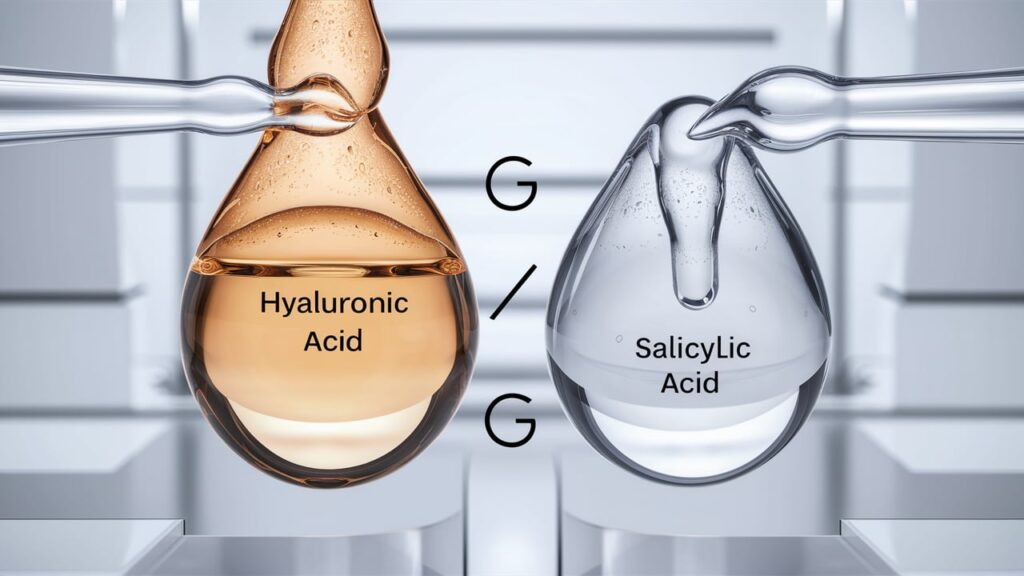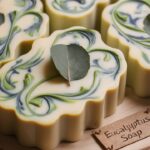- Hyaluronic Acid (HA): Known for its exceptional ability to retain moisture, making it a key ingredient for hydration
- Salicylic Acid (SA): A beta-hydroxy acid (BHA) popular for treating acne, it penetrates pores to clear excess oil and dead skin cells
- Recent research suggests that certain forms of hyaluronic acid can stimulate collagen production, improving skin elasticity and reducing fine lines.
- Beyond acne treatment, salicylic acid can control sebum production, reduce pore size, treat hyperpigmentation, and improve overall skin texture.
- Experts recommend using these acids based on skin type—hyaluronic acid for dry, mature skin and salicylic acid for oily, acne-prone skin.
In the ever-evolving world of skincare, two powerhouse ingredients continue to dominate conversations among beauty enthusiasts and dermatologists alike: hyaluronic acid hydration and salicylic acid.
Let’s examine the latest research, expert opinions, and user experiences to unravel the mysteries behind skincare ingredients.
Complete Guide to Glycolic Acid for Skin Lightening: Science, Benefits, and Safety Tips
The Acid Test: Understanding the Basics
Before we compare the two ingredients, let’s examine what each one brings to the skincare table.
Known for its incredible ability to hold up to 1000 times its weight in water, hyaluronic acid benefits are undeniable. “It’s like a drink of water for your skin,” explains Dr. Elena Rodriguez, a board-certified dermatologist based in New York, who recommends using a hyaluronic acid moisturizer as part of a daily skincare routine.
On the other hand, salicylic acid is a popular acne treatment product. As a beta-hydroxy acid (BHA), it penetrates pores and clears out excess oil and dead skin cells. Dr. James Chen, a dermatologist specializing in acne treatment, notes, “Salicylic acid is the go-to for breakouts and blackheads.”
The Science Speaks: Latest Research Findings
Recent studies have shed new light on both acids’ efficacy and potential applications, challenging some long-held beliefs in the skincare community.
Hyaluronic Acid: More Than Just Moisture
A groundbreaking 2023 study in the Journal of Cosmetic Dermatology revealed that hyaluronic acid might have more tricks up its sleeve than previously thought. Researchers found that certain HA forms could stimulate collagen production, leading to improved skin elasticity and reduced fine lines. Moreover, hyaluronic acid’s anti-aging benefits can be seen in its ability to plump up fine lines and wrinkles, giving the skin a more youthful appearance.
Salicylic Acid: The Multi-Tasking Marvel
Meanwhile, salicylic acid continues to prove its worth beyond acne treatment. The acid can be particularly useful in controlling sebum production and reducing pores. A 2024 study in the International Journal of Molecular Sciences highlighted SA’s potential in treating hyperpigmentation and improving overall skin texture. Furthermore, salicylic acid pore cleansing properties can help to unclog pores and prevent blackheads, leading to a smoother and more even-toned complexion.
Celebrity Dermatologist Weighs In: Dr. Anna Park’s Take
Dr. Anna Park, a dermatologist to Hollywood’s A-list, offers her perspective on the hyaluronic acid vs salicylic acid debate. “It’s not about choosing one over the other,” she argues. The key is understanding your skin’s needs and using these ingredients strategically. As a dermatologist-recommended acid expert, I always recommend a personalized approach.”
She recommends a tailored plan:
- For dry, mature skin: Focus on hyaluronic acid to plump and hydrate
- For oily, acne-prone skin: Incorporate salicylic acid for oily skin to manage breakouts
- For combination skin: Use both, but in different areas or at different times
The Real-World Test: User Experiences
As scientific research continues, real-world users share their experiences with these acids across social media platforms.
Instagram Insights Beauty influencer Sophia Chang conducted a split-face experiment, using hydrating skincare ingredients on one side and salicylic acid on the other for 30 days. Her results? “The HA side was more plump and hydrated, but the SA side had a more even tone and fewer breakouts,” she reported to her 500K followers.
TikTok Trends The #AcidFaceOff challenge took TikTok by storm in early 2024, with users documenting their experiences using either HA or SA products and learning about the importance of exfoliating acids for skin in their skincare routines. User @skincareobsessed’s video, garnered over 2 million views, showed dramatic before-and-after results using a salicylic acid serum on her acne-prone skin.
Industry Innovations: What’s New in 2024?
The beauty industry isn’t resting on its laurels regarding these popular acids. This year has seen a surge in innovative products and formulations, leading to a greater focus on the combination acid skincare approach.
“We’re seeing a new generation of hyaluronic acid products,” says cosmetic chemist Dr. Rebecca Lee. “When choosing skincare acids, it’s essential to consider the individual skin type and concerns.”
The trend of using multi-acid skincare products is rising, particularly those that pair salicylic acid with complementary ingredients. “Products that pair SA with niacinamide or bakuchiol are showing promising results for treating acne while minimizing irritation,” notes Dr. Chen.
Potential Risks and Side Effects: What You Need to Know
While both acids have proven benefits, they’re not without potential drawbacks. The best acid for skin concerns is salicylic acid, which can be drying, especially for already dry or sensitive skin.
Hyaluronic Acid Cautions
- Over-application can potentially draw moisture from deeper skin layers if not used correctly.
- Some users report a temporary “sticky” feeling on the skin
Salicylic Acid Warnings
- Can be drying, especially for dry or sensitive skin
- May increase sun sensitivity, making proper SPF use crucial
Dr. Rodriguez advises, “Start with lower concentrations and patch test any new product, regardless of how gentle it seems.”
Looking Ahead: The Future of Acid-Based Skincare
As we look towards the future, experts predict continued innovation in acid-based skincare.
“We’re just scratching the surface of what these ingredients can do,” says Dr. Park. “I anticipate seeing more targeted delivery systems and specialized formulations in the coming years.”
Some areas of future research and development include:
- Microbiome-friendly acid formulations
- Sustainable sourcing of hyaluronic acid
- Novel applications of salicylic acid derivatives
The Bottom Line: Choosing the Right Acid for You
So, which acid comes out on top? Experts agree that both hyaluronic acid and salicylic acid have their place in skincare routines.
Dr. Rodriguez offers this advice: “Consider your primary skin concerns. If hydration and plumping are your goals, reach for hyaluronic acid. Salicylic acid is your best bet if you’re battling acne or oiliness. And remember, for many people, using both – at different times or on different areas of the face – can yield the best results.”
Key Takeaways:
- Hyaluronic acid excels at hydration and may have additional anti-aging benefits
- Salicylic acid is effective for acne treatment and may help with hyperpigmentation
- New research is expanding our understanding of both acids’ potential
- Innovative products are combining these ingredients in novel ways
- Consider your skin type and concerns when choosing between HA and SA
- Consult with a dermatologist for personalized skincare advice

I’m a devoted organic skincare enthusiast, passionate about the natural, wholesome goodness that organic products bring to our skin.
Organic skincare isn’t just a hobby for me—it’s a lifestyle. Every product I use, recommend, and write about has been carefully chosen for its purity and effectiveness. Everything I write about is backed by scientific studies, dermatologists’ opinions, and user experiences.
I also excel at tackling skincare challenges with innovative, organic solutions.


